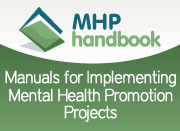Tools
- Utilities:
- Print this page
- Send this page
- Font size:
- Increase font size
- Decrease font size
Policy Documents
Login, so as to add your own items.
-
Edinburgh Declaration on Mental Health Promotion
26/10/2010
The Edinburgh Declaration on Mental Health Promotion has been produced by the European Network for Workplace Health Promotion in October 2010. It aims to draw attention to the need to promote mental health and well-being at work by the Social Partners and other stakeholders. It envisages that 10 actions can be taken to promote workplace mental health and well-being. -
Living Conditions, Social Exclusion and Mental Wellbeing – Second European Quality of Life Survey
15/01/2010
The European Quality of Life Survey (EQLS) was conducted by the European Foundation for the Improvement of Living and Working Conditions (Eurofound) for the first time in 2003, covering 28 countries (the 15 EU Member States, 12 forthcoming Member States and Turkey). Eurofound’s second wave of the EQLS, which was carried out in 2007, offers a wide-ranging view of the diverse social realities in 31 countries – the current 27 EU Member States, along with Norway and the three candidate countries of Croatia, the Former Yugoslav Republic of Macedonia and Turkey.
Many of the questions posed in the first EQLS in 2003 were asked again, on issues such as employment, income, education, housing, family, health, work–life balance, life satisfaction and perceived quality of society. In 2008, Eurofound commissioned secondary analyses of the EQLS data around key policy themes. The selected themes for the first set of secondary analyses are the following: trends in quality of life in Europe 2003–2008; living conditions, social exclusion and mental well-being; family life and work; subjective well-being; and quality of society and public services.
This analytical report focuses on the theme of living conditions, social exclusion and mental well-being. It draws on the results of the EQLS to examine the factors that influence perceived social exclusion and the impact that this has on mental well-being. Such factors include labour market access, income and lifestyle standards, and access to social support. The scope of the findings – spanning 31 countries – offers an important insight into how social exclusion and integration vary across Europe, given the different cultural and historical contexts as well as recent social and economic experiences. -
Working our Way to Better Mental Health: A Framework for Action
04/01/2010
Mental ill-health presents a major challenge to the well-being of our society, and the strength of our economy. It blights lives, traps people in poverty and prevents the country harnessing the talents and potential of hundreds of thousands of people. Government is determined to lead the way in meeting this challenge.
Poor mental health is very common. At any one time, one in three of our working-age population may be experiencing some kind of distress or mental health condition such as depression. The vast majority, fortunately, will recover quickly. But for far too many, the result is a lengthy sickness absence or long-term unemployment.
Indeed mental ill-health is now the most common reason for claiming health-related benefits and 86 per cent remain on the benefits for more than three months (compared to 76 per cent for all other claimants). And the evidence shows that the longer people are detached from the labour market, the less chance they have of returning to work.
This is even more of a risk when, as now, global economic problems are pushing up jobless figures around the world. We have learnt from past recessions of the real danger of short-term job loss turning into permanent unemployment and are determined not to repeat these mistakes.
The positive link between employment and mental health is absolutely clear. Research shows people generally enjoy better mental health when they are in work. In contrast, the longer individuals are absent or out of work, the more likely they are to experience depression or anxiety. Work can therefore play a vital role in improving everyone’s well-being and mental health.
Of this we estimate around one third - £30-40 billion – can be attributed to mental ill-health, in lost production, and National Health Service (NHS) treatment. And it does not count the additional and hidden cost of people with mental health conditions still in jobs but working beneath their full potential.
A modern economy cannot afford such waste of individual talent nor the high welfare costs. We are determined to step up our efforts to support people in work and to help those out of work to return quickly to fulfilling and rewarding employment. -
Promoting Mental Wellbeing through Productive and Healthy Working Conditions: Guidance for Employers
03/12/2009
The Department of Health (DH) asked the National Institute for Health and Clinical Excellence (NICE) to produce public health guidance on promoting mental wellbeing through productive and healthy work.
The guidance is for those who have a direct or indirect role in, and responsibility for, promoting mental wellbeing at work. This includes all employers and their representatives, irrespective of the size of the business or organisation and whether they are in the public, private, or voluntary sectors. It may also be of interest to professionals working in human resources or occupational health, employees, trade unions representatives and members of the public. -
SLAN Survey of Lifestyle, Attitudes and Nutrition in Ireland - Mental Health and Social Well-being
03/03/2009
This report presents the main findings on the mental health and social well-being of Irish adults from the 2007 Survey of Lifestyle, Attitudes and Nutrition (SLÁN 2007). The SLÁN 2007 survey, commissioned by the Department of Health and Children, involved face-to-face interviews at home addresses with 10,364 respondents (62% response rate), aged 18 years and over; full details are given in the SLÁN 2007 Main Report (Morgan et al, 2008). This sample was representative of the general population in Ireland and was further weighted, for the purpose of analysis, to match the Census 2006 figures. SLÁN 2007 is, therefore, the largest national survey to date on the extent of both positive and negative mental health and social well-being in the Irish adult population. -
Dame Carol Black’s Review of the Health of Britain’s Working-Age Population – Summary of Evidence Submitted
25/02/2009
In 2007, the Secretaries of State for Health and for Work and Pensions commissioned the National Director for Health and Work, Dame Carol Black, to undertake the first ever review of the health of Britain’s working age population. Dame Carol announced a Call for Evidence at a round-table event with leading business and medical professionals in October 2007. This was held in London and chaired by the two Secretaries of State.
Responses to the Call for Evidence were invited through the Health, Work and Well-being website (www.workingforhealth.gov,uk), and promoted in a variety of media at the national and regional level. They were further supplemented by six discussion events held across Britain during November 2007. -
Dame Carol Black’s Review of the Health of Britain’s Working-Age Population – Working for a Healthier Tomorrow
25/02/2009
Improving the health of the working age population is critically important for everyone, in order to secure both higher economic growth and increased social justice.
The Review has sought to establish the foundations for a broad consensus around a new vision for health and work in Britain. At the heart of this vision are three principal objectives:
• prevention of illness and promotion of health and well-being;
• early intervention for those who develop a health condition; and
• an improvement in the health of those out of work – so that everyone with the potential to work has the support they need to do so. -
Improving Health and Work: Changing Lives. The Government’s Response to Dame Carol Black’s Review of the Health of Britain’s Working-Age Population
25/02/2009
This document details the Government’s response to the Review of Britain’s working-age population, conducted by Dame Carol Black. The Government’s response is built around three key aspirations that demonstrate how they will rise to the challenges that she set and which will enable the Governments delivery of their broader version:
• creating new perspectives on health and work;
• improving work and workplaces; and
• supporting people to work. -
Mental Health and Work
25/02/2009
The Secretary of State for Health and the Secretary of State for Work and Pensions have asked Professor Dame Carol Black, National Director for Health and Work, to lead a review of the health-related factors that influence working life in Great Britain, and make recommendations. The review will inform policy and guide action in relation to health and employment. -
European Commission Health Strategy - 'Together for Health: A Strategic Approach for the EU 2008-2013'
24/10/2007
On 23 October 2007 the European Commission adopted a new Health Strategy, 'Together for Health: A Strategic Approach for the EU 2008-2013'. Building on current work, this Strategy aims to provide, for the first time, an overarching strategic framework spanning core issues in health as well as health in all policies and global health issues. The Strategy aims to set clear objectives to guide future work on health at the European level, and to put in place an implementation mechanism to achieve those objectives, working in partnership with Member States.


